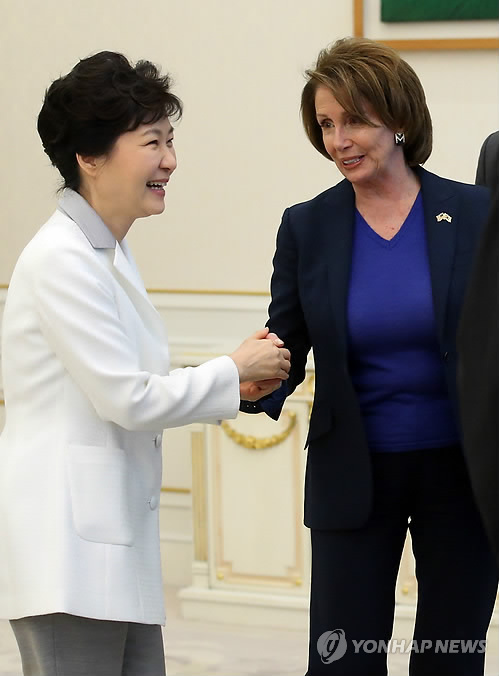by REERA YOO | @reeraboo
editor@charactermedia.com
U.S. House Minority Leader Nancy Pelosi urged Japanese Prime Minister Shinzo Abe on Thursday to acknowledge and apologize for the sexual slavery committed by Japan during World War II, reports Yonhap News Agency.
When asked about her thoughts on Abe’s upcoming congressional speech in Washington, Pelosi told reporters, “We have been clear about what we’d like to hear about comfort women. I hope that a statement will be made to free [Japanese] people from this burden of the issue of comfort women.”
Pelosi met with South Korean Foreign Minister Yun Byung-se on Thursday and discussed issues regarding North Korea as well as the relationship between South Korea and Japan. She also met with South Korean President Park Geun-hye, who expressed the urgency of the “comfort women” issue as the victims are in their late 80s, according to Park’s office.
Although Pelosi said it is not necessary for Abe to apologize before Congress, she expressed hope that the prime minister “apologizes in some format.”
“I would imagine if the prime minister is going to make a statement, he [would] probably do that in his own country rather than somebody else’s country,” Pelosi said, according to Yonhap.
For decades, South Korea has repeatedly urged Japan to take responsibility for forcing Korean and other Asian women to work in military brothels during World War II. There is still no sign of resolution between the two countries.
In 1993, former Japanese chief cabinet secretary Yohei Kono offered an official apology to the victims of Japan’s wartime sex slavery. However, since Abe came to power, his government has been attempting to revise previous statements, like Kono’s apology, making an all-out effort to deny Japan’s involvement in forced prostitution.
In a recent interview with the Washington Post, Abe described wartime “comfort women” as victims of “human trafficking” without specifying the perpetrator, angering Koreans and activists.
Last month, a group of U.S. veterans wrote a letter to Congress, arguing that Abe should only be invited to address Congress if he clearly acknowledges Japan’s wartime conduct. Korean American civic groups also took out an advertisement in The Hill, an American political newspaper, demanding that Abe should apologize to the elderly comfort women before his congressional speech.
Abe is expected to speak before a joint session of Congress on April 29 and will become the first Japanese prime minister to accomplish this feat.
___







